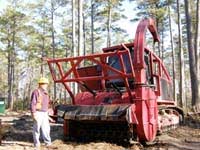A new machine to harvest forest underbrush for use as fuel had its first public demonstration Wednesday in woods east of New Bern.
About 50 people in hard hats watched as the machine gobbled trees in the forest off County Line Road. Those watching the one-of-a-kind bush eater represented the gamut of public and private forest-related industries and service in North Carolina.
The big red processor, pushed by a tractor on treads, uses carbide teeth to pulverize everything in its six-foot path. As the 56,000-pound behemoth cuts a trail, a belt-driven vacuum sucks the ground-up cuttings through an extended chute over the cab and into an agricultural silage wagon hitched to the tractor.
Despite its weight, the machine produces ground pressure of only 7.1 pounds per square foot, so it moves easily over soft forest bed and pocosin.
The biomass harvester is being developed by North Carolina State University for Fecon Inc., manufacturer of the heavy equipment and attachments including Bull Hog commercial mulchers, in cooperation with Tim Tabak, a Craven County forestry management consultant.
The new harvester allows more of the forest’s organic products — bushes, leaves and needles, and trees under 6 inches in diameter — to be used for bio-diesel and ethanol in addition to its present market in steam-generated electric production, Roise said.
“It is powerful,” he said. The machine has a 440-horsepower engine.
When perfected, it is expected to be used mostly for plantation thinning in tree farming, for clearing between the rows, and for forest management, said Roise.
Roise has been working since the summer with Tabak and NCSU Forestry graduate students Lindsay Hannum and Glen Catts to correct design flaws.
But Roise said the work thus far has produced “results much better than we ever thought. It’s done remarkably.”
Croatan National Forest District Ranger Lauren Hillman sees potential for forest management in fire prevention and habitat preservation or restoration.
Camp Lejeune’s efforts to restore habitat for red-cockaded woodpeckers might be able helped by the machine, said Danny Marshburn, base forest manager.
John Duff of Rankin Timber Company in New Bern said, “I think it will be useful tool on a lot of forest land that is tough to manage.”
The machine can now harvest between two and four tons of forest bulk an hour and it's real profitability lies in harvesting brush for bio-diesel and ethanol. Its advantage for that use is that it blows underbrush upward without picking up the dirt.
The product saved from just being mulch on the forest floor contains both oil and sugar, said Roise and fellow NCSU professor Dennis Hazel.
The oil would be used for bio-diesel or the sugar for ethanol. The professors are already debating which element of the biomass grabbed by the harvester will make it pay off first.

